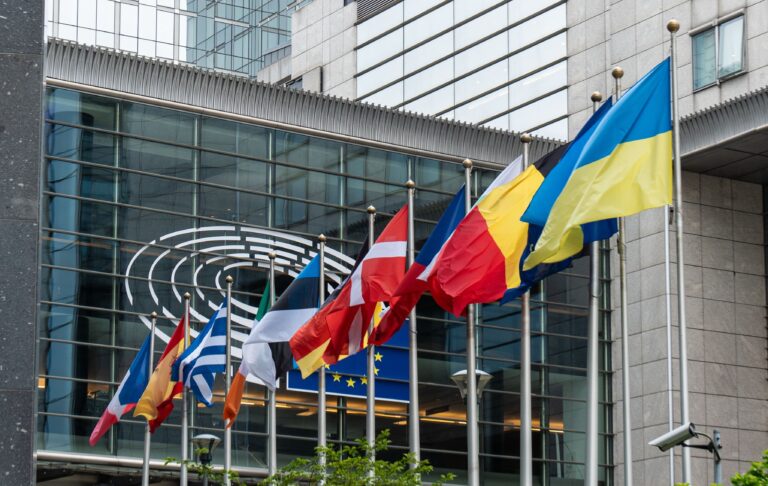Leaders from the European Union, the United Kingdom, and NATO convened in Brussels on Monday to discuss bolstering Europe’s defence capabilities in the face of increasing threats from Russia. The high-level talks come at a time when former U.S. President Donald Trump is pressuring NATO allies to significantly boost their military spending, raising concerns about the future of transatlantic security cooperation.
A Historic Gathering in Brussels
The meeting marks a “triple first” in European diplomatic history: the first EU summit since the inauguration of a new U.S. president, the first dedicated session on defence policies, and the first attendance of a British prime minister since Brexit.
In the wake of Russia’s full-scale invasion of Ukraine nearly three years ago, European nations have been ramping up their military budgets. However, concerns remain that their efforts are still insufficient to deter potential aggression from Moscow. Intelligence reports suggest that Russia could pose a direct military threat to European nations in the coming years, increasing the urgency of the discussions.
Trump’s Influence on NATO Spending
The return of Donald Trump to the political stage has reignited debates on NATO’s defence obligations. Trump has demanded that NATO member states more than double their current defence spending target to 5% of GDP, a figure that remains out of reach for most European nations. His push for greater financial contributions has sparked fears that the U.S. might reduce its security commitments to Europe.
Additionally, Trump’s assertions that he could swiftly end Russia’s war in Ukraine have raised alarms among European leaders. Many worry that his approach could sideline their efforts and pressure Ukraine into an unfavorable peace settlement.
Key Topics on the Agenda
Beyond NATO spending, European leaders discussed Trump’s recent geopolitical moves, including his renewed interest in acquiring Greenland. Danish Prime Minister Mette Frederiksen is expected to push for a unified European stance against any such claims. Furthermore, discussions touched on Trump’s pledge to impose tariffs on European goods—a move that has prompted EU officials to vow a strong retaliatory response if implemented.
Challenges in Strengthening European Defence
There is broad consensus among European nations on the need to enhance defence capabilities. However, disagreements persist regarding the specifics of investment and strategic coordination.
Brussels estimates that the EU will need to allocate an additional €500 billion ($510 billion) for defence over the next decade. The primary points of contention revolve around how to fund these expenditures, whether EU funds should be exclusively used for European-made weapons, and how NATO should fit into the broader security framework.
A divide has also emerged between countries closer to Russia, which are rapidly increasing their defence budgets, and those further west, which are taking a more cautious approach. Some EU members advocate for joint borrowing to finance military upgrades, but Germany, facing a crucial election, has opposed such measures.
France vs. Other EU Members on Arms Procurement
Another critical issue is how European nations should source their military equipment. France insists that EU funds should be used to purchase weapons manufactured within the bloc, strengthening the European defence industry. Others, however, argue that nations should procure arms from the fastest available suppliers, including the United States, as a strategic move to maintain U.S. support.
NATO’s Role and Future of EU-UK Defence Cooperation
The role of NATO in European security remains a hot topic. Some EU officials suggest that Brussels should take a more active role in setting military capability targets for member states, an idea that has sparked tensions within NATO. With uncertainties surrounding U.S. commitments, European leaders are exploring new ways to strengthen their military cooperation.
Meanwhile, the UK’s re-engagement with the EU on defence matters has attracted attention. Prime Minister Keir Starmer, the first British leader to attend an EU Council meeting since Brexit, called on European nations to ramp up their efforts in countering Russian aggression. He emphasized the need for stronger UK-EU defence and security cooperation to ensure a stable and secure Europe.
Starmer’s visit signifies a potential thaw in UK-EU relations, particularly in defence matters. However, lingering disputes, such as fishing rights and youth mobility agreements, remain obstacles to deeper collaboration. Some EU officials have made it clear that further progress on defence ties would require the UK to resolve these outstanding issues.
Looking Ahead: Europe’s Defence Future
As European nations grapple with these pressing security challenges, the outcome of these discussions will shape the continent’s defence strategies for years to come. While significant hurdles remain, there is a shared understanding that Europe must take greater responsibility for its security in an increasingly uncertain geopolitical landscape.
For more insights on international politics and security, visit Nepal Monitor, your trusted source for global news and analysis.


